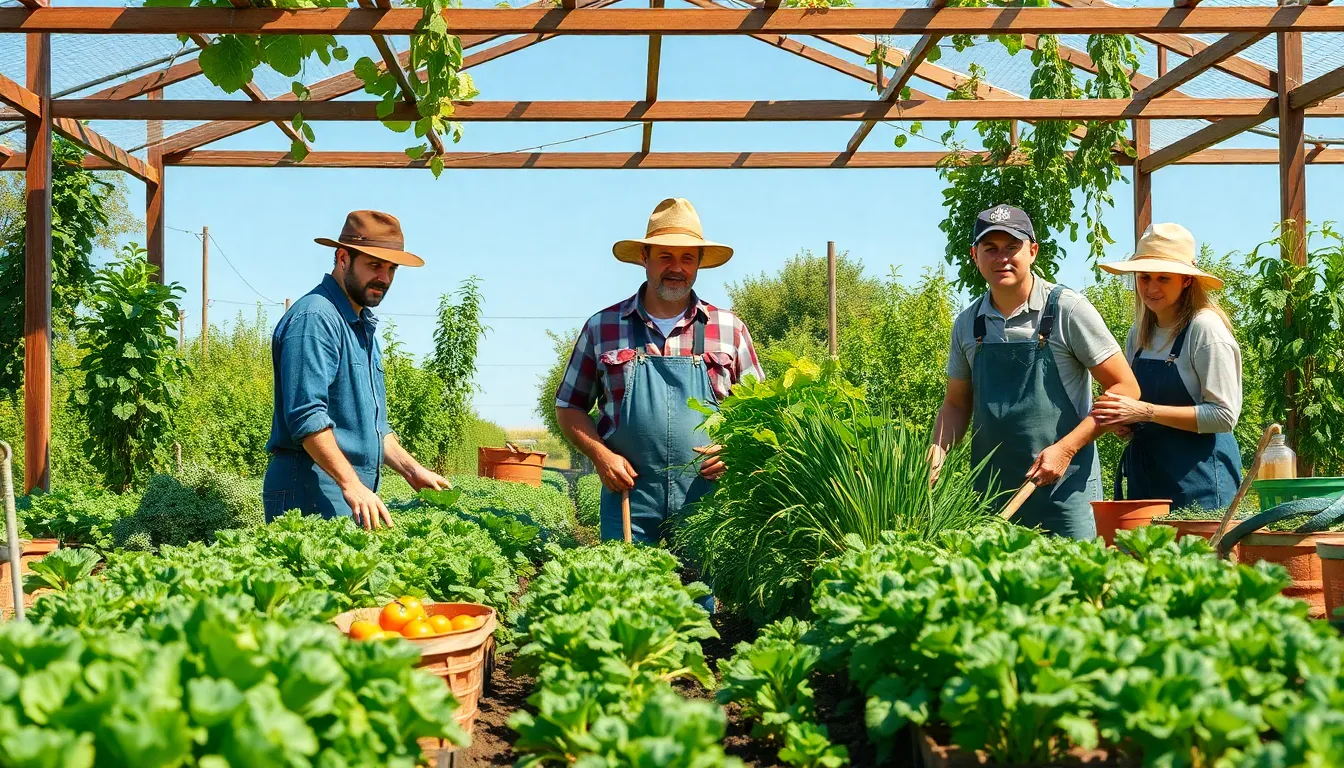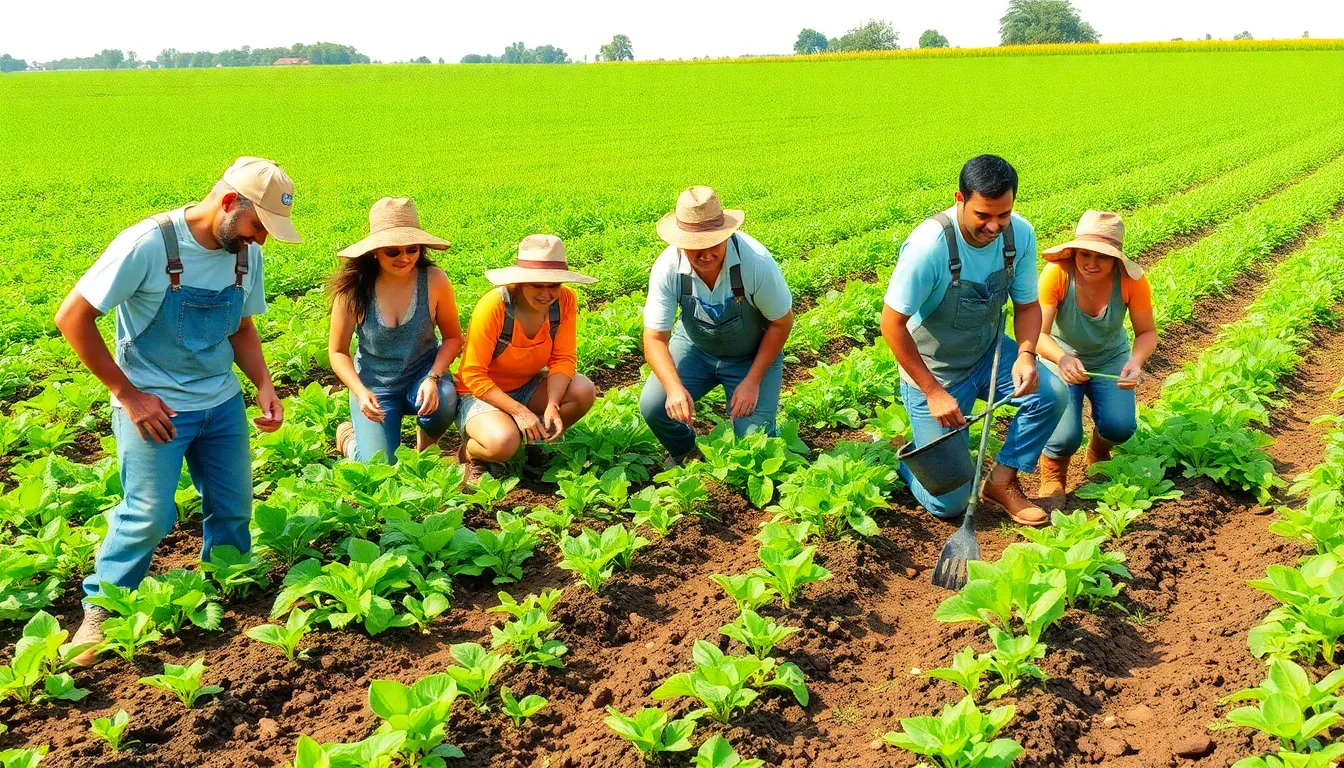Imagine a world where your dinner plate is more futuristic than a sci-fi movie. Future food trends are set to revolutionize how we eat, combining technology with sustainability to create meals that not only taste great but also save the planet. From lab-grown meats that make your taste buds dance to plant-based innovations that even carnivores can’t resist, the culinary landscape is changing faster than you can say “gluten-free kale chips.”
Table of Contents
ToggleOverview of Future Food Trends
Emerging food trends focus on technology integration and sustainability. Lab-grown meats represent a significant advancement, offering an alternative that reduces environmental impact and animal suffering. Plant-based options gain popularity, providing accessibility for various dietary preferences while appealing to a broader audience.
Sustainable practices play a critical role in food production. Urban farming initiatives promote local sourcing, enhancing flavor and reducing carbon footprints. Vertical farming techniques leverage space efficiency, allowing fresh produce cultivation in dense urban environments.
Innovative packaging solutions respond to consumer demand for eco-friendly products. Biodegradable materials replace plastic, contributing to waste reduction and appealing to environmentally conscious consumers. Smart packaging technologies, like freshness indicators, enhance food safety and minimize food waste.
Flavors and culinary experiences evolve alongside health-conscious trends. Functional foods, such as adaptogens and probiotics, offer health benefits while satisfying cravings. Global cuisine influences lead to diverse flavor profiles, encouraging chefs to experiment with fusion dishes.
Plant-forward diets gain traction as individuals seek healthier lifestyles. Emphasis on whole foods results in meals rich in fruits, vegetables, nuts, and legumes. This trend aligns with a growing awareness of nutrition and its importance for overall well-being.
Elevated convenience products emerge to meet the fast-paced lifestyle of consumers. Ready-to-eat meals and meal kits provide nutritious options with minimal effort. Technology simplifies meal preparation through apps that tailor recipes to individual preferences and dietary restrictions.
Future food trends showcase a remarkable transformation in the culinary landscape. The focus on sustainability, health, and innovative technology ensures that food choices better align with consumer values and lifestyles.
Sustainable Practices in Food Production


Sustainable practices play a crucial role in transforming food production methods. They emphasize eco-friendly approaches that prioritize environmental health and resource efficiency.
Organic Farming Techniques
Organic farming techniques focus on cultivating crops without synthetic pesticides or fertilizers. These methods enhance soil health by using crop rotations and cover crops, which improve biodiversity. Additionally, organic practices often maintain higher water retention, leading to better resilience against droughts. Innovations in organic pest management help reduce the need for chemical interventions. Farmers adopting these practices contribute to reducing carbon emissions while producing healthier food options that meet consumer demands.
Reducing Food Waste
Reducing food waste remains a significant challenge in the food industry. Approximately 30-40% of the food supply in the U.S. ends up as waste, highlighting the need for effective solutions. Implementing advanced inventory management systems enables retailers to track product freshness and manage stock levels. Additionally, consumer education campaigns encourage mindful purchasing and meal planning. By prioritizing food redistribution efforts, organizations can connect surplus food with those in need, fostering community resilience. These strategies not only minimize environmental impact but also enhance food security for vulnerable populations.
Plant-Based Innovations
Plant-based innovations play a crucial role in the future of food trends, aligning with consumer demands for sustainable and nutritious options. These advancements include a range of alternatives and products that redefine traditional eating habits.
Alternative Proteins
Alternative proteins are gaining traction as consumers seek healthier, more sustainable diets. Sources like pea protein, lentils, and quinoa provide high nutritional value without the environmental impact associated with livestock farming. Research indicates that the global alternative protein market is expected to reach $27 billion by 2027. Many startups are developing cell-cultured meats and plant-based seafood, aiming to replicate textures and flavors without animal products. These innovations cater to diverse dietary preferences while addressing ethical and environmental concerns.
Dairy-Free Alternatives
Dairy-free alternatives continue to grow in popularity, meeting the needs of lactose-intolerant individuals and those opting for plant-centric diets. Products made from almond, soy, and coconut are widely available in supermarkets, offering consumers more choices. Data shows that the dairy alternatives market is projected to surpass $40 billion by 2025. Innovations in this field also include better-tasting yogurts and cheeses, improving upon earlier formulations. As consumer awareness of the environmental effects of dairy production rises, these alternatives provide satisfying options that align with modern dietary preferences.
Technology in Food
Emerging technologies are revolutionizing the food industry. Innovations like lab-grown meat and smart farming are reshaping how food is produced and consumed.
Lab-Grown Meat
Lab-grown meat continues to gain traction as a sustainable alternative to traditional meat products. By cultivating animal cells in a controlled environment, this process reduces the environmental impact associated with livestock farming. Startups are investing heavily in making lab-grown options more accessible to the public. Market research indicates that acceptance of lab-grown meat is growing, with a projected market value expected to reach $15 billion by 2030. This technology promises not only to meet rising protein demands but also to alleviate ethical concerns related to animal welfare.
Smart Farming Solutions
Smart farming solutions enhance agricultural efficiency through technology. Sensors and drones monitor crop health, optimizing water and nutrient use. Data-driven insights empower farmers to make informed decisions, significantly reducing waste and increasing yields. Automated systems streamline processes from planting to harvesting, enabling faster response times to changing conditions. Innovations in this field allow for more localized food production, ultimately minimizing transportation emissions. Agricultural experts predict that by 2025, the global smart agriculture market will surpass $23 billion, underscoring its critical role in shaping the future of food production.
Health and Nutrition Focus
Growing awareness among consumers is shifting attention toward health and nutrition in food choices. Emphasis on whole foods and functional ingredients continues to rise.
Functional Foods
Functional foods offer additional health benefits beyond basic nutrition. Adaptogens, known for their stress-reducing properties, are emerging as popular choices. Probiotics, which support gut health, gain traction among health-conscious individuals. Antioxidants also feature prominently, with foods rich in these compounds providing immune system support. Research indicates that functional food markets could exceed $275 billion by 2025. Consumers are increasingly seeking these nutrient-dense options to enhance overall well-being.
Personalized Nutrition
Personalized nutrition adapts dietary plans to individual needs and preferences. Technology plays a crucial role in analyzing genetics, lifestyle, and health data. This approach helps consumers receive tailored recommendations specific to their nutritional requirements. Companies are developing apps and services that provide curated meal plans and supplements. The personalized nutrition market is projected to reach $11.5 billion by 2026. As consumers seek optimization of their health, this trend prioritizes tailored solutions that align with their unique lifestyles.

